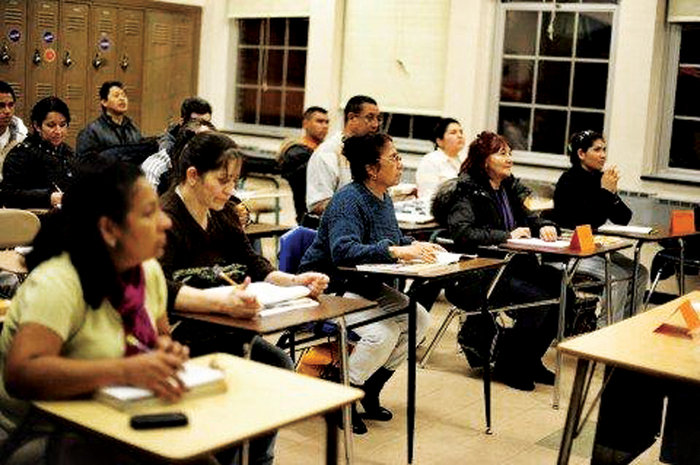Luis Iza came to the New York area from Cuba at the age of 9, speaking no English. Thanks to three incredibly generous teachers and a church member who took him and his family in, he learned English and had a chance at a better life.
Many years later, he and his wife Maggie were at the dinner table in their home in West New York.
“My wife and I are both people with a heart for the disadvantaged, and our conversations during dinner always revolve around the topic of social justice,” Iza explained last week. “We were discussing how the recession would impact the new immigrants in the community, and how we found access to English classes lacking.”
In 2010, Open Door was born. It began with a few phone calls to friends who offered to volunteer to tutor, a lawyer who helped the Izas set up a 501 c3 incorporation, and a conversation with West New York Superintendent of Schools John Fauta, who allowed them to use Memorial High School for their evening classes.
“By giving people in our community a shot, you open up people’s potential.” – Luis Iza
____________
Fast forward two years later, and Iza has over 200 students, with 60 on a wait list.
The generation gap
Open Door is Iza and his wife’s second non-profit. Their first, Operation Exodus, which helps underprivileged children in Washington Heights, helped them to get a handle on the widening cultural and communication gap between children from immigrant families and their parents or grandparents.
“In my own family, my mom is a Spanish speaker,” Iza said. “There’s a gulf between her and her grandchildren who have become English dominant and their Spanish is not so great.”
Iza has also found that the number one reason his students give for learning English is not to find jobs, as he had thought. It is because they want to communicate with their children and their children’s teachers, he said.
He and his wife have also found a level of dedication among his students that never ceases to impress him.
“The first year we noticed that half of the adults would come straight to class from work without eating dinner,” he said. “So we started bringing snacks for them. There is a very high level of motivation to learn.”
And high motivation means success. Open Door offers five levels of English classes, and he says around 98 percent of students are promoted to the next level.
Last year, four of them graduated from the final level, and with the continued help of Nazareth Baptist Church’s pastor Pablo Flores, they celebrated at the church.
“Pablo Flores has a great heart for the community,” Iza said. “We plan to expand our classes to Saturdays and are working together to make that happen.”
Latino cultural issues
While classes begin at 7 p.m. and last an hour and half Mondays and Tuesdays, Iza and his wife offer an extra half hour “assembly” during which they address the issues immigrants face beyond the language barrier and provide motivational talks.
“We talk about low self esteem, and how many people feel totally overwhelmed in this society,” Iza said. “We also openly discuss marital stress, which is a big issue if you work two jobs a day and have two kids and you get home and they’re crying.”
While discussing personal issues, particularly for Latino men, is not necessarily a cultural norm, Iza said that his students have been more than willing, evidenced by the fact that over 70 percent of students stay on for the extra half hour.
Iza uses personal experience and a dash of humor to discuss how he feels machismo in the culture has become distorted to encourage the poor treatment of men’s wives or girlfriends.
“I tell them about the first fight in my marriage,” he said. “Maggie asked me to wash the dishes, and like a good Cuban, I said, ‘No way.’ And guess what happened? I am now an expert dishwasher.” Iza laughed. “We’re trying to bring the idea of macho back to the respectful place it’s supposed to be.”
Iza and his wife hope to expand their program and network with other foundations and corporations that can allow Open Door to help meet the great local need.
“By giving people in our community a shot, you open up people’s potential,” Iza said. “We live in a beautiful town. Once given a chance, you’d be surprised what comes out.”
The next round of English classes begins in September. For more information on Open Door, visit www.theopendoornjny.com.
Gennarose Pope may be reached at gpope@hudsonreporter.com
